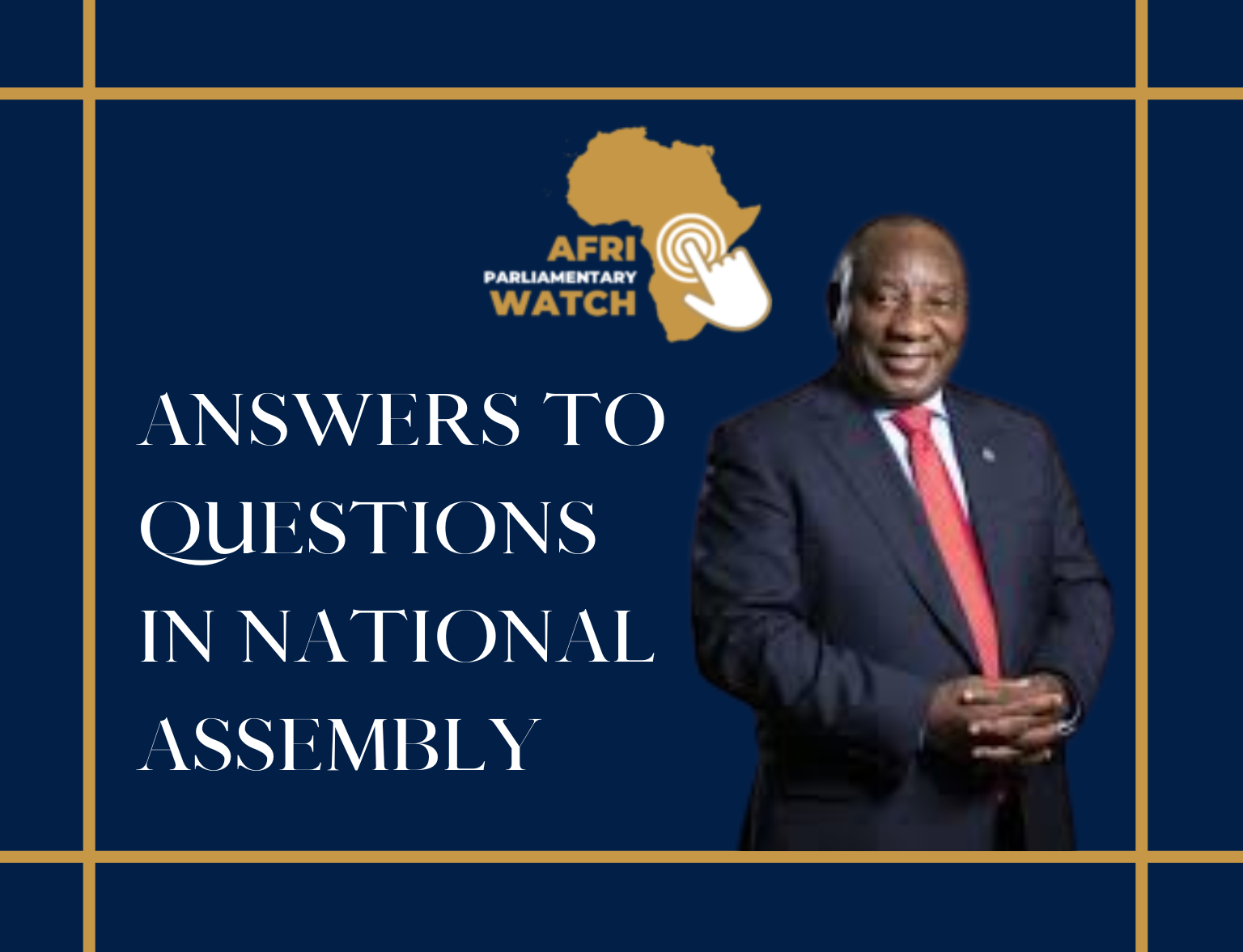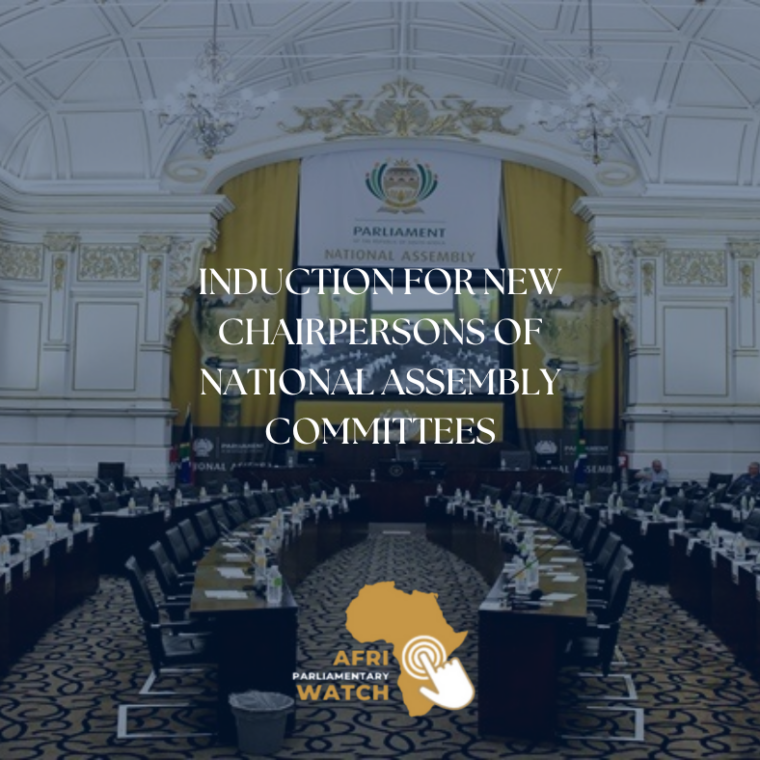30 March 2023
QUESTION
1. Mr S J Mohai (Free State: ANC) to ask the President of the Republic:
Whether, in light of the noticeable advances that have been made in assisting the persons who are living in extreme poverty and the unemployed to alleviate immediate food poverty and hunger through the Social Relief of Distress (SRD) grant, the Government has considered any permanent or long-term based policy solutions and/or alternatives to the SRD grant; if not, what is the position in this regard; if so, what are the relevant details?
CO1120E
REPLY
Honourable Members,
Government is committed to fighting poverty and providing support to those who are unemployed as a core responsibility of the state.
The implementation of the Social Relief of Distress Grant since 2020 has been one of the important achievements of this administration.
It has lifted millions of South Africans above the food poverty line at a time of great economic distruption due to the COVID-19 pandemic and made a significant difference in the lives of many people.
Social grants support economic growth from the bottom up, enable business activity and strengthen social solidarity and stability. According to research, approximately
50 per cent of the purchases made by SRD grant recipients are groceries. Informal traders in various parts of the country have reported to researchers that the SRD Grant stimulated customer spending, provided capital to purchase stock, and enabled the new businesses to be initiated.
This grant will be maintained until March 2024 while the economy continues to recover from the impact of the pandemic.
Various options are being explored, taking into account affordability, financing options and efficacy in addressing poverty.
There is a concerted effort within government to link current grant beneficiaries to various economic opportunities such as skills development, sustainable livelihood programmes and job creation initiatives.
Some of these economic opportunities include the Expanded Public Works Programme and the Presidential Employment Stimulus, in addition to partnerships with the private sector to increase opportunities for the unemployed to access other sources of income.
South Africa already provides extensive social security support through grants that reach more than 46 per cent of the population.
As we work to build the economy and create employment, we remain committed to find appropriate mechanisms to support all those people who need assistance from the state within the resources available.
I thank you.
QUESTION 2
PROFESSIONALISATION OF PUBLIC SERVICE
2. Mr W A S Aucamp (Northern Cape: DA) to ask the President of the Republic:
Whether he will commit to fully implement the National Framework towards Professionalisation of the Public Sector and its policy directives that was approved by Cabinet on 19 October 2022 in order to do away with cadre deployment (details furnished)?
CO167E
REPLY
Honourable Members,
In the State of the National Address on 9 February 2023, we committed to the full implementation of the National Framework Towards the Professionalisation of the Public Sector.
Among other things, the Framework has been introduced to ensure that only ethical, qualified and competent individuals are appointed into positions of authority.
The Framework lays down clear requirements for recruitment and selection processes, mandatory induction for new public servants and performance management. It prioritises continuous learning so that the skills and capabilities of public servants are always improving.
The Framework will help to do away with undue interference, the violation of public procurement rules or the favouring of certain private sector interests, as happened during the state capture era.
The Framework will also contribute to greater stability in the senior leadership of the public service.
Cadre deployment – just like the DA’s practice of vetting candidates for employment in DA-led municipalities – is not a policy of this government. Whatever internal processes political parties undertake, we are clear that the merit principle must apply in public sector appointments, based on legislated prescripts and in line with the minimum competency standards.
We are taking steps to professionalise the public service across all spheres, to ensure the right people are in the right positions, that they are held accountable, and that they are empowered to provide the best possible service to the people.
To support this effort, we are undertaking skills audits in all infrastructure and service departments.
These audits will help us understand where critical skills do exist in these departments to effectively deliver infrastructure and services. The National School of Government will work with other organs of state like the Human Sciences Research Council to conduct these audits.
The adoption and implementation of the Framework gives renewed momentum to the drive that commenced with the start of this administration to build a public sector that is ethical, professional and efficient.
This Framework should be welcomed by the country’s public servants as an important tool for their progression as they work on the frontline to deliver on the promise of a better life for every South African.
I thank you.
QUESTION
3. Ms B N Ndongeni (Eastern Cape: ANC) to ask the President of the Republic:
Whether the Government has considered any interventions to ensure that load shedding does not adversely derail and/or affect plans to provide services to South Africans, especially in ensuring that the poor have uninterrupted access to basic services such as healthcare, education, water and sanitation; if not why not; if so, (a) what interventions and (b) what are the further relevant details?
CO1121E
REPLY
Honourable Members,
Load shedding has an impact on nearly every aspect of our lives.
It affects everyone from large firms to small businesses and households, making it more difficult to work, to study and to produce goods.
Our primary focus is on reducing the severity and frequency of load shedding through a range of interventions that are being coordinated by the National Energy Crisis Committee. Earlier this month, I appointed a Minister of Electricity to lead this effort.
Among the priorities announced in the State of the Nation Address is to address the impact of load shedding on different sectors of society and the economy.
This includes ensuring the continuity of basic services, especially for the poor.
Work is underway to ensure that critical facilities are excluded from load shedding where the network configuration allows for this, and where it is feasible to do so without increasing the risk of higher stages of load shedding.
These include commuter rail infrastructure, bulk water supply systems and facilities essential to the production of energy.
Many of our public health facilities, including hospitals and community health centres, have back-up power supply systems, which include generators. This will reduce disruptions to service provision.
Furthermore, the Department of Health has been working with Eskom and municipalities to exclude health facilities from load shedding where possible. As many as 77 hospitals have been exempted to date.
Eskom has identified a further 46 hospitals which can be excluded from load shedding with additional infrastructure.
The two parties continue to work together to establish possible solutions to be implemented to exempt more hospitals.
We will continue to explore ways of preventing the disruption of basic services and reducing the impact of load shedding, as we work to achieve energy security.
Ultimately, the best way to address the impact of load shedding is to reduce its severity and frequency. This is why we continue to implement the Energy Action Plan to fix Eskom’s power stations, reduce demand and add new generation capacity as quickly as possible.
I thank you.
QUESTION
4. Mr S F Du Toit (North West: FF Plus) to ask the President of the Republic:
Whether the size of the recent Cabinet reshuffle is in the best interest of the country, taking into account that the fiscus cannot afford it any longer; if not, what is the position in this regard; if so, what are the relevant details?
CO171E
REPLY
Honourable Members,
The size and configuration of the Executive should be guided by the needs of the country.
At this moment in our country’s history, when we have urgent and pressing developmental needs, when we have to undo the devastating legacy of apartheid, we need an active and capable, developmental state.
We need a state that has the resources and ability to tackle challenges like poverty, joblessness, homelessness, illiteracy, lack of social infrastructure and a significant burden of disease.
At the same time, account needs to be taken of available resources. Where it is possible to rationalise ministries, departments and other state entities without affecting outcomes, we should do so.
At the start of this administration in 2019, we reduced the number of ministries from 34 to 28.
We combined a number of ministries. For example, we combined Trade and Industry with Economic Development, Higher Education and Training with Science and Technology, Environmental Affairs with Forestry and Fisheries, Agriculture with Land Reform and Rural Development, among others.
We need to recognise that a country’s needs change over time and that we need to learn from our lived experience.
The two new ministries I announced earlier this month respond to specific needs that our country has at this time.
As I explained in the State of the Nation Address, we need a Minister to coordinate and drive our response to the electricity crisis. This is a temporary position and the Minister will remain in office only for as long as it is necessary to resolve the crisis.
The second new ministry, for Planning, Monitoring and Evaluation, arises from an appreciation that we need a dedicated focus on ensuring that government effectively implements the programmes that underpin our priorities and is able to fix problems as they arise.
Neither of these ministries requires the establishment of new departments. The Minister of Electricity will work with relevant departments and entities to coordinate implementation of the Energy Action Plan, and the Minister of Planning, Monitoring and Evaluation will be responsible for the existing Department of Planning, Monitoring and Evaluation.
We are forging ahead with the process we embarked upon at the start of this administration to build a capable state with entities that add value to government’s programme of action.
In all this work, we are informed by evidence, experience and the availability of resources. We agree that we need an efficient and lean government, but if we become fixated by head counts, we may lose sight of the point of having a capable state in the first place.
I thank you.
QUESTION
5. Mr J J Londt (Western Cape: DA) to ask the President of the Republic:
With reference to the recent greylisting of South Africa by the Financial Action Task Force (FATF), what progress has been made with the implementation of the urgent steps the Government is taking as announced in his newsletter on 27 February 2023 to (a) remove the country from the FATF’s grey list and (b) address the concerns that have been identified by the FATF, including the noncompliance with the various international standards in combating money laundering and other serious financial crimes?
CO168E
REPLY
Honourable Members,
In 2019, South Africa underwent a mutual evaluation of its anti-money laundering and combating of the financing of terrorism system. The evaluation was undertaken together with the Financial Action Task Force, which is a global body that aims to tackle global money laundering and terrorist financing.
Since the publication of the mutual evaluation report in October 2021, government has been working with its various authorities to address the deficiencies that were identified in the report.
The Financial Action Task Force acknowledged in its February 2023 Plenary media statement the significant progress made by South Africa to address most of the 67 recommended actions identified in our mutual evaluation.
Such progress included the passage of two key Acts at the end of December 2022,
namely the General Laws (Anti-Money Laundering and Combating Terrorism Financing) Amendment Act and the Protection of Constitutional Democracy Against Terrorism and Related Activities Amendment Act
As a result, our agreed Action Plan has now been reduced to eight focus areas.
These areas relate largely to the effectiveness of our authorities in implementing the various elements of our anti-money laundering and combating of the financing of terrorism system.
The Cabinet has established an interdepartmental committee to continue the work to ensure that the country addresses all the outstanding deficiencies.
The committee is supporting the relevant authorities to, among other things, demonstrate an increase in the investigation and prosecution of serious and complex money-laundering and terrorism financing, an increase in mutual legal assistance requests to other countries, an increase in the use of financial intelligence by law enforcement agencies, and the effective implementation of targeted financial sanctions.
A period of time is needed to demonstrate improvements on the outstanding deficiencies. It is estimated that the country needs at least six months to demonstrate whether the recent amendments adopted by Parliament in December 2022 are effective.
It is our hope that South Africa will make sufficient progress by next year to be removed from the greylist.
I thank you.
QUESTION
6. Mr M I Rayi (Eastern Cape: ANC) to ask the President of the Republic:
Whether the Government has identified the key interprovincial red tape challenges that are negatively impacting on measures to advance township and rural economies, particularly in attracting both national-based and foreign investment opportunities; if not, why not; if so, (a) what measures are in place to address such challenges (details furnished) and (b) what are the further relevant details?
CO1122E
REPLY
Honourable Members,
The Red Tape Reduction Team in the Presidency, led by Mr Sipho Nkosi, has prioritised dealing with red tape that constrains economic activity.
This includes reviewing the regulatory burden on informal enterprises and traders that operate in townships and in rural areas. In addition, various initiatives are underway across government to improve the ease of doing business.
The Department of Small Business Development established an Inter-Provincial Task Team to address the issue of inter-provincial red tape.
This process has identified substantial gaps in dealing with red tape reduction at the provincial level, and has worked closely with provinces to address this.
The absence in some provinces of formal structures and functions, programming and interventions require high levels of collaboration and coordination between multiple stakeholders, which is not always achieved.
The Department of Small Business Development has identified 29 pieces of legislation that negatively affect small businesses across the three spheres of government, which are currently being prioritised for action.
The Department of Trade, Industry and Competition and Invest SA undertake capacity building for various public entities at a provincial level on investment promotion and aftercare services.
We expect every department and every level of government to reduce red tape as a key enabler to the growth of our economy.
I thank you.
CAPE TOWN




